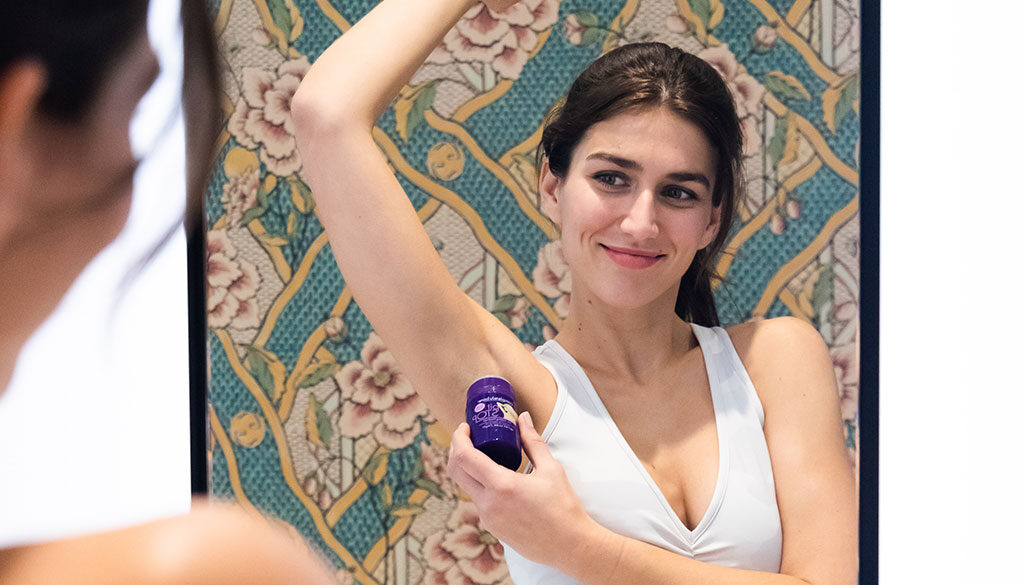Should you use natural deodorant? Here’s what you should know.
By Natalia Mesa
*Read the original article here: https://www.nationalgeographic.com/science/article/natural-deodorant-aluminum-parabens
Why do some say natural deodorants are better—and are the claims accurate?
Many antiperspirants use aluminum, which plays a big role in stopping sweat. Without it, experts say, your deodorant may not be as effective.
Many natural deodorants claim not to contain ingredients like aluminum, phthalates, and parabens. But are these so-called “safer” and “greener” products actually any better for you or the planet?
Body odor comes from bacteria that reside on our skin, which break down sweat and produce pungent scents. Deodorants and antiperspirants both work to reduce that odor. The difference is antiperspirants stop you from sweating, while deodorants typically contain products that soak up sweat, kill bacteria, or mask smells.
Body odor is a perfectly normal part of our physiology, and it may even be a way we communicate with other humans, says Pam Dalton, a cognitive psychologist at the Monell Chemical Senses Center.
It can change based on our mood, age, and health status, and the culture in which we live: most cultures don’t think of body odor as unpleasant, she says. “Bad-smelling body odor is culturally based, in terms of what we find to be very unpleasant versus pleasant.”
The U.S. is uniquely averse to the smell skin-dwelling bacteria produce. In 2023, the U.S. deodorant market was worth a whopping $6 billion, a quarter of the total global market.
Antiperspirants prevent sweat from leaving your armpits, feet, or wherever else you apply it, making your skin less hospitable for sweat-loving, odor-producing bacteria. Aluminum is often used for this, plugging up perspiration-producing glands called eccrine and apocrine glands, the latter of which are concentrated in the hairy parts of the body.
Deodorants only target smells, not sweating. They can contain other ingredients with antimicrobial properties, like baking soda, can also be effective for some people.
Why are these ingredients causing concern, and is there any truth to it? We spoke with several experts to find out.
Does “natural” mean “safe”?
Some deodorant products are labeled as “natural,” but there’s not a clear, standard definition of what that means, says University of San Francisco dermatologist Nina Botto.
“Natural” could mean anything from use of only plant-derived ingredients to lack of aluminum compounds that can be absorbed through the skin.
Antiperspirants are the only odor-masking products require FDA approval meaning that, unlike the chemicals in deodorants, the FDA has rigorously evaluated them for both safety and efficacy, says Joe Zagorski, a toxicologist for the Center of Research on Ingredient Safety at Michigan State University.
Because antiperspirants reduce both sweat and odor, they are likely to be the most effective for most people, says Botto. While the aluminum in antiperspirants can cause a type of allergic reaction called contact dermatitis for a small minority of people with sensitive skin, it’s usually perfectly safe for most underarms, she adds.
The persistent rumor that aluminum in antiperspirants causes breast cancer—started by an email chain in the 1990s—is not backed by scientific evidence, and scientists now largely disregard the idea, says breast cancer oncologist Harold Burstein. While there is some evidence that a small amount of aluminum is absorbed through the skin, there’s no reason to panic about aluminum-containing products causing Alzheimer’s. Scientists have failed to find a clear link between Alzheimer’s and aluminum, he adds.
How effective are deodorants?
Without aluminum, deodorants don’t stop the root cause of body odor: sweat. Therefore, deodorants are less likely to be as effective as antiperspirants, says Dalton.
But, “it depends on the person,” Dalton adds. Some people sweat more than others, and not everyone has the same odor-producing bacteria on their skin. That means deodorants can be a sufficient way to block body odor in one person but ineffective for another person.
Deodorants can contain ingredients like aluminum crystals—thought to be too big to be absorbed through your armpits—as well as other mineral salts, prebiotics, probiotics, and natural fragrances such as essential oils, Zagorski explains.
Aluminum crystals and other mineral salts are meant to prevent bacterial growth while prebiotics and probiotics purport to lessen smelly bacteria on your skin. Zagorski says that while there’s some evidence that aluminum crystals work well, most of these ingredients haven’t been rigorously tested for efficacy.
Are deodorants safer than antiperspirants?
Deodorants are composed of ingredients that are generally recognized as safe (GRAS) by the FDA. While manufacturers don’t have to show that the deodorants they make work, “all manufacturers of these products do have a legal liability to show that their products are safe for human use,” Zagorski says.
Natural deodorants sometimes market themselves as free of other chemicals besides aluminum, including parabens and phthalates. Parabens are typically used as preservatives, and phthalates make deodorants and antiperspirants easier to spread. Both are known endocrine disrupters, chemicals that interfere with the body’s ability to make hormones (these products are also present in other personal care products, pharmaceuticals, and even some foods).
Endocrine disruptors have been linked to cancers in laboratory mice, causing worries that they might cause similar effects in humans. Zagorski says that scientific evidence shows deodorants and antiperspirants are safe for human use, and these products exist in such small amounts that they more than likely don’t pose harm.
Jeannette Graf, a dermatologist at Mount Sinai School of Medicine, agrees that there’s no reason to worry about parabens. Even according to the American Chemical Society, there’s likely no link between parabens in personal care products and breast cancer.
However, while most experts say that deodorants and antiperspirants are safe to use, not all experts agree. Brody, a senior scientist at the Silent Spring Institute, says there isn’t enough evidence to discount endocrine disrupters as a potential cause of breast cancer in women. While it’s true that they may only be in beauty products in small amounts, the cumulative effect may be significant, Brody says.
For those that want to avoid these chemicals, it might be tough, Brody adds, because not all ingredients are listed on the label. Silent Spring has been working on apps that help consumers demystify what’s in their personal care products, such as Detox Me.
But Botto and Zagorski also both say that just because an ingredient is plant-derived, that doesn’t mean it’s safe. Zagorski also says that some plant-derived products are also known endocrine disruptors, lavender oil and tea tree oil being notable examples.
In addition, Botto says she sees more people come in due to skin issues caused by natural fragrances, not synthetic ones. She usually cautions her patients against natural fragrances, and to go fragrance-free instead.
Considering environmental impacts
There might also be a good environmental reason to stay away from fragrances, too. In 2018, Brian McDonald, a researcher at NOAA, and his lab published a study showing that in major cities in the US, deodorants, along with shampoos and other fragrances, contribute significantly to pollution in the form of volatile organic compounds (VOCs), at least now that emissions from vehicles have gone down.
“Personal care products put in fragrances of the natural environment,” these fragrances react with certain compounds in the atmosphere. That “contributes to air pollution,” McDonald says.
The deodorant industry also produces 15 billion pounds of plastic every year, which contributes to the global plastic waste problem.
While the environmentally conscious may want to stick to fragrance-free, plastic-free products. McDonald says he acknowledges that “people wear personal care products for a reason. The question is are there ways we can formulate products that pollute less.”
Ultimately, “people should decide what they feel comfortable with,” says Graf. Dalton agrees. “People should think about their goals, look at the ingredient list, and then make a decision that’s right for them.”



